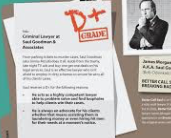Disparagement of Competition, Lawyer’s Version.
Posted By Cliff Tuttle | January 21, 2019

Image: 2civility.org
No. 1,605
While traveling, I saw a personal injury lawyer’s ad on TV in another state. I was actually shocked.
It stated that many attorneys accept personal injury cases who are unqualified. Some have never been in court, it stated. However, if you call the phone number provided, this firm will apparently tell you about the lawyer or law firm you are thinking of hiring.
Of course, we don’t know what kind of information will be communicated to the caller. Suppose that the information were limited to year of admission and disciplinary record. Would providing that information be ethically or legally objectionable? After all, everything disclosed is a matter of public record.
But if we open that door, there is plenty of public information that can give an incomplete or misleading picture. Civil suits, criminal and driving records come to mind. While the potential clients could look up such information for themselves, if they call this out-of-state firm, they probably hadn’t thought of it — until then.
As to whether the lawyer in question has ever tried a case, unless he/she has recently been admitted to practice, such a conclusion could only be guesswork. Some recent grads have gained valuable advocacy experience in legal clinics, moot court competition or even as a debater in college or high school. And who is to say what the minimum level of experience should be for this lawyer to handle your case?
Some young lawyers are natural litigators. Some gain their experience very quickly, perhaps in the district attorney’s or or public defender’s office. They may log more hours questioning witnesses and presenting arguments in court in a month than a junior associate in a civil litigation firm does in five years. One is performing in court all day while the other is busy writing briefs and occasionally sitting in silence as the second chair. Another equalizer: advice and guidance from older lawyers.
Without more information, you just don’t know.
On the other hand, many cases require experience, not just in litigation, but in the specific subject matter of the litigation. Even a litigator highly experienced in other specialties may not suffice to handle such a case. It is safe to say that no lawyer today can be competent to practice in every area of the law.
So how do you, the client, find out? Ask your prospective lawyer about what he/she brings to the table. Spend enough time doing it to form a valid assessment. You might be surprised by the candor of the response. And you might also be surprised to learn that this lawyer has unique qualifications, like relevant experience out there in the real world.
CLT
Tags: Legal ethics > selecting lawyers > trial experience



